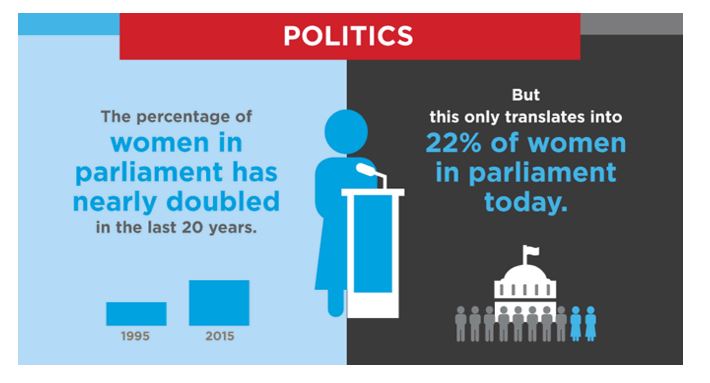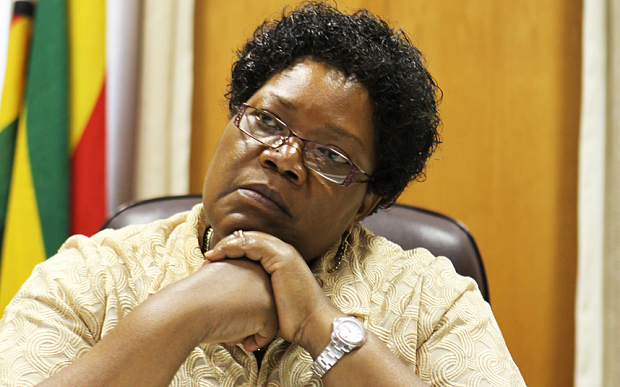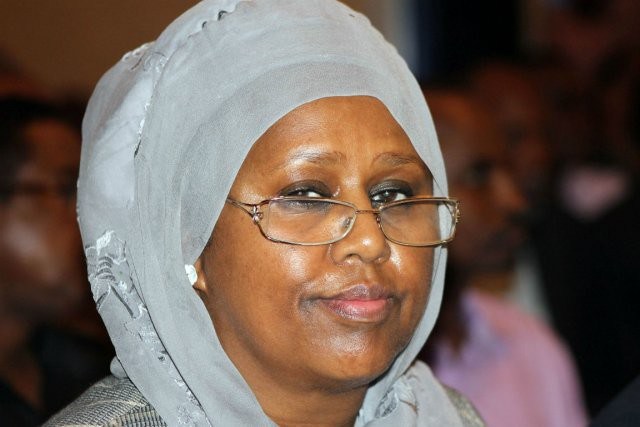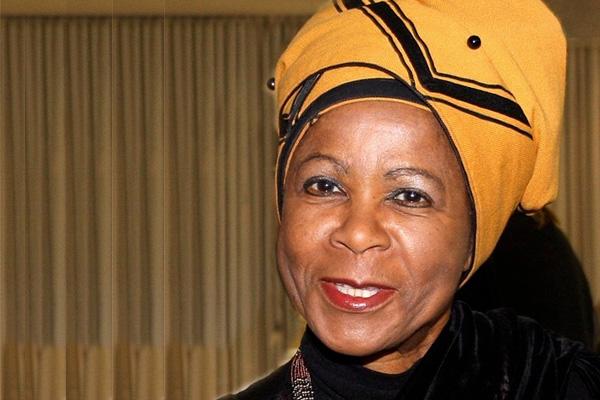President of Chile, Michelle Bachelet notably said, “When one woman is a leader, it changes her. When more women are leaders, it changes politics and policies.” While many would argue that women throughout Africa have always been politically active, perhaps just not necessarily in an official capacity, more women are contesting and engaging in the political sphere.
This UN diagram below shows a vast difference between women’s presence in parliament from 1995 to 2015.

In Africa, however, the report observes that women parliamentarians in sub-Saharan Africa increased by 23.0 percent, while North Africa grew by 17.1 percent. The report recommends 30 percent as an important benchmark for women’s representation around the world. According to the report, as of August 2015, Rwanda had the highest number of women parliamentarians worldwide, citing that women in the country have won 63.8 percent of seats in the lower house.
In 2003, political scientist, Kira Sanbonmatsu attempted to explain the reason why women’s participation in politics seems to have increased on the continent. She suggested that women are beginning to recognize the importance of representing other women in positions of authority. This, according to her, is the driving force behind participation because women will naturally show support for ‘one of their own’. “Women would be even more supportive of electing more women to public office if they were knowledgeable as men about the extent of women’s under representation”, she concluded.
In 2015, Africa witnessed a significant number of women represented in political positions, determined to prove their political prowess. Political scientist, Damilola Taiye Agbalajobi outlined women empowerment programs, activities of the United Nations (UN) and other international organizations, quotas and proportional representation as reasons why more women are being represented in African politics. In 2015, the media showcased a lot of these female politicians but at the same time, most were not. While the following women were not featured in the media, they are active politicians in their countries and are steadily influencing the next generation of female politicians and political activists on the continent.
Hala Shukrallah – Egypt
In 2014, Hala Shukrallah made history in Egypt to emerge as the first female and Christian leader of a major political party in the country. At the age of 59, she was voted as the leader of the Al-Dostour political party. At the time, she saw her appointment as a major change in the social status of women in Egypt. “I think it’s a reflection of the changes in the people’s psyche since the 25 January revolution that toppled Hosni Mubarak. They do not really see these elements as significant – being a woman, being a Copt (an ethno-religious group which constitute the largest group of Christians, situated in North Africa and the Middle East, mainly in the area of modern Egypt), or whatever. These elements are no longer significant in comparison to a much bigger thing that they are aspiring to”, she said. Shukrallah holds a Master’s Degree in sociology from the University of Sussex in the United Kingdom and a PhD from the University College London. Her term as party leader came to an end in 2015.
Joice Mujuru – Zimbabwe
The Guardian referred to her as the woman threatening to topple Robert Mugabe from his position as president of the country. Mujuru was previously the Vice President to Mugabe and left office in September 2014. She was accused of plotting a coup against Mugabe in 2014 by the first lady, Grace Mugabe, and subsequently lost her place in the ZANU-PF political party. She is currently set to launch her own political party, ‘People First’ and run independently in Zimbabwe’s 2018 elections. The Telegraph reports that Mujuru’s political party has been welcomed by other political parties in the country including Zimbabwe’s official opposition, the Movement for Democratic Change (MDC).
Nadia Labidi – Algeria
Also a filmmaker, Labidi was appointed minister of culture in 2014, which many considered a milestone for Algerians in terms of female inclusion and the advancement of women in politics. In 2012, a new law was passed by the Algerian government, which stipulated a quota system for women’s participation in parliament, a change that the UN hailed as opening up opportunities for more than 100 women in the political field. Following the appointments of female ministers in Algeria, regional director for the Arab States of the United Nations for Women, Samira El-Tewegry made a statement saying Algeria had established itself as “a role model for other Arab countries.”
Fowsiyo Yusuf H. Adan – Somalia
Before becoming Somalia’s first female Foreign Affairs Minister and Deputy Prime Minister, Adan lived in the United Kingdom, while there, she was actively involved in advancing the living conditions of Somalis based in the UK. Her commitment to develop her country continued even after she became Foreign Minister and later Deputy Prime Minister of Somalia. As the foreign affairs minister, she was able to recover national assets that were previously frozen She also signed an agreement with Sheikh Abdullah bin Zayed al-Nahyan of the United Arab Emirates, for bilateral cooperation between both countries. Adan was Foreign Affairs Minister and Deputy Prime Minister of Somalia from November 4, 2012 to January 17, 2014.
Esther Murugi Mathenge – Kenya
When it comes to female participation in politics in Africa, Esther Mathenge is a pioneer and an activist. The 62-year-old politician was elected to represent the Nyeri constituency in the National Assembly in 2007. Additionally she is also committed to empowering Kenyan women to get involved in decision making in the country. She has spent two terms in office and is also a member of the Kenyan Women Parliamentary Association (KEWOPA), a membership organization supported by Voluntary Service Overseas (VSO) to address issues facing women in politics and build up their capacity to participate more.
Adiato Djalo Nandigna – Guinea Bissau
Adiato Djalo Nandigna was the first female Acting Prime Minister of Guinea Bissau, albeit a briefly as her tenure ran from February 10 to April 12 2012. She is a member of the African Party for the Independence of Guinea and Cape Verde. Even though the country experienced civil and political unrest, many believe the country is moving forward. In October 2015, Nandigna and Aida Injai Fernandes, another female politican, were appointed minister of defense and minister of justice which are key portfolios in the country.
Virginia Ngozi Etiaba – Nigeria
Popularly called Mama Anambra, Etiaba will go down in history as the very first democratically elected governor in Anambra state from November 2, 2006 to June 13, 2007. As governor, she flagged-off several road projects and invested heavily in the state’s Orient Petroleum Company. She was reluctant to take oath of office after her boss, Peter Obi had been impeached on grounds of gross misconduct. She however transferred power to Obi when the impeachment was annulled by the appeal court. In 2012, she released a book; My Life, My Story: Autobiography of Nigeria’s First Female Governor, which chronicles her life and her political journey. She once said; “If a woman is given the chance to rule Nigeria, the country will be corruption free, as only less than one percent of women are corrupt. Nigerians should pray for an era when a woman will come on board to rule this country.”
Fanny Chirisa – Zimbabwe
Chirisa was one of the women sworn into Zimbabwe’s 8th parliament on September 2013. Before then, she was and is still involved in steering women toward political participation. Women now comprise 124 of the 350 Members of Parliament in Zimbabwe, including 86 women in the National Assembly – 60 in the reserved seats and 26 elected directly to the 210 constituency seats. For several years, Chirisa led the Women in Politics Support Unit (WiPSU) in Zimbabwe as Director. In her capacity as a WIPSU Director, she influenced the promotion of equity and accountability among public officials so that they become effective leaders. She also works to strengthen young women and students to harness their leadership qualities and skills, so as to ensure effective political participation.
Margaret Nasha – Botswana
As the first speaker of Botswana’s parliament, Margaret Nasha emerged speaker from October 2009 to October 2014. With a background in Botswana’s civil service and ministries of public administration and local government, she first entered the cabinet in 1994 and in 1999 won the parliamentary seat for Gaborone Central. Last year, Nasha released her book; “Madam Speaker, Sir; Breaking the Glass Ceiling, One Woman’s Struggles”. The book focuses on equal opportunities for men and women in Botswana. It also addresses the conversation around President Ian Khama’s perceived dictatorship.
Mamphela Ramphele – South Africa
Prior to her departure from party politics on July 8, 2014, Ramphele was actively involved in driving the ‘South African dream’. As an anti-apartheid activist and a former Managing Director at the World Bank, she is well known. However, before she decided to quit politics, she agreed to stand as candidate for the Democratic Alliance during the 2014 presidential elections. All she wants now is to influence the civil society in her own way. “I have decided to leave party politics and return to working alongside my fellow citizens in civil society to pursue the dream of transforming ours into a more just and prosperous society”, she said.


















